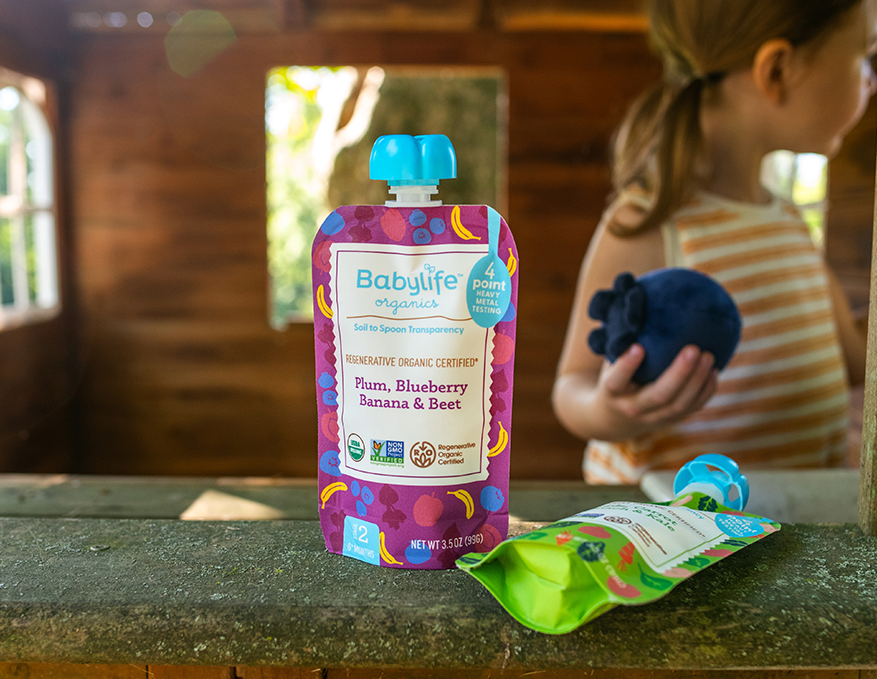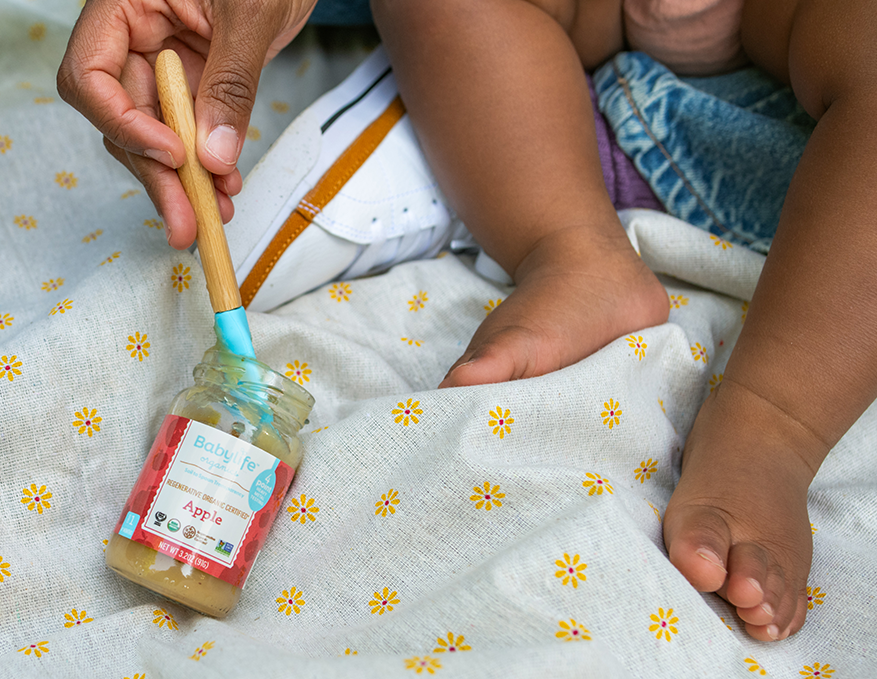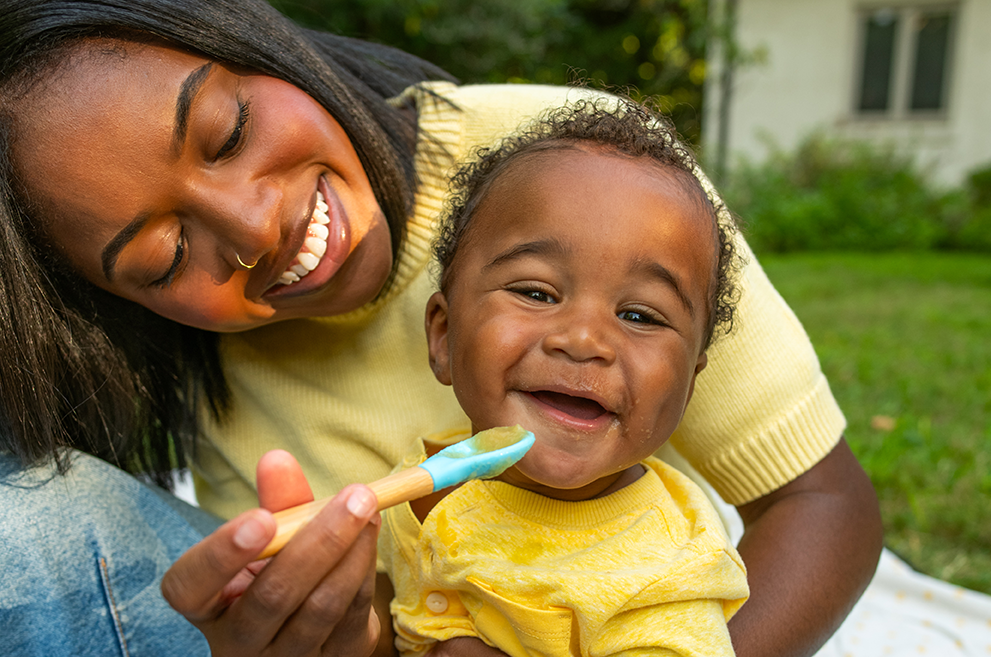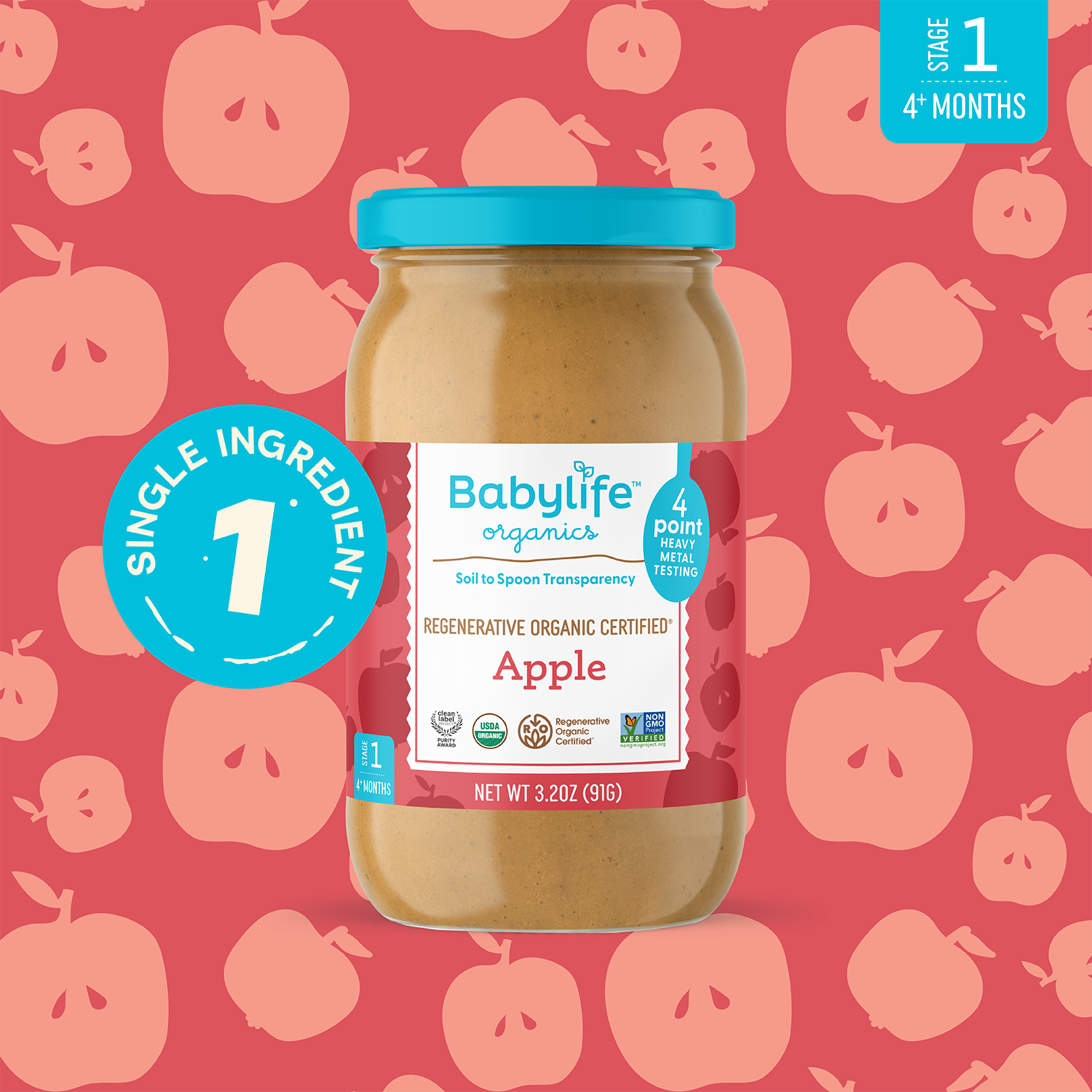As conscientious parents, we’ve been hearing about the benefits of feeding our kids organic food for years OR we’ve been shopping for organic products for our kids for a while now. So what exactly does ‘regenerative’ organic certification mean, and how does it matter to the health and safety of our babies?
We have spent many years trying to find a clearer answer to those questions for parents—and we believe that getting Regenerative Organic Certification for our baby food at launch is the best solution. Instead of further complicating the decision of what to buy, this relatively new badge on the block makes it crystal clear: ROC™ products meet the highest standards in the world for soil health, animal welfare, and farmworker fairness.
Soil health, in particular, may be most important when it comes to the safety of kids’ food: “Our goal is to help parents understand that what really matters is the soil where baby’s fruit and vegetables are grown,” says Richard Harford, CEO of Babylife Organics. “That’s where we start. That’s the problem we tackle. We know our soil. We regenerate our soil. We test our soil.”
In an effort to be completely transparent with parents (you can’t say one without the other!), we’re digging up the not-so-dirty-truth on the Regenerative Organic Certification process, and walking you through what it really means and why it matters when it comes to heavy metal levels in food. We walk you through the way companies achieve this particular certification – which is no small feat – and why it’s worth investing in not just for the health of our kids, but for the future of the planet too.
WHAT REGENERATIVE ORGANIC CERTIFICATION MEANS
For parents to understand why Regenerative Organic Certification matters when selecting baby food, it’s essential to dig beneath the surface-level of the term. For starters, Regenerative Organic Certified® was established by the nonprofit Regenerative Organic Alliance (ROA), which was founded in 2017/8 by a group of farmers, business leaders and experts at Rodale Institute, Dr. Bronner’s,and Patagonia among other eco-minded companies. ROC™ uses the USDA Certified Organic standard as a baseline. From there, it adds important criteria that incorporate the three major pillars of regenerative organic agriculture into one certification: soil health, animal welfare, social fairness.
The first pillar, soil health, is what’s most important when it comes to the food we feed our children: “The six inches of soil where seeds are sown and food is grown; those are the six inches that matter the most,” says Harford. ROC™ farms must adopt certain agricultural practices that build, rather than degrade, soils by increasing soil organic matter, biodiversity and fertility1. The practices that focus on regenerating soil health include implementing vegetative cover, crop rotation, rotational grazing and composting, in addition to not using any synthetic fertilizers or pesticides. When combined, these practices result in soil that contains more organic matter and produces healthier plants/crops without disease or pests2.
By partnering with a regenerative organic farm that our team had a decades-long relationship with, we were able to do something few baby food companies have been able to do: establish a single supply chain to control the ingredient quality and get complete transparency into the soil health. “We needed to develop a differentiated direct sourcing supply chain all the way back to the farms, which is unique compared to the multi-layered, brokered supply chain approach many organic baby food companies operate through,” Harford says.
A parent of four grown children himself, Harford ultimately wanted to empower parents to feel confident about the choice they’re making when standing in that overwhelming baby food aisle.
“Through our partnership with Elite Farms, we realized we were sitting on the answer to better baby food,” he says. “We could disrupt the category and level up expectations with a brand that proves there is a better way to make baby food, soil to spoon.”
HOW BABYLIFE ACHIEVED REGENERATIVE ORGANIC CERTIFICATION
One of the reasons why you don’t see the ROC™ badge on food products more often is because it can be so difficult to get: “The process is extremely challenging. The bar is incredibly high,” says Harford. ”To earn this seal for our entire portfolio of baby food, is incredible. We have 15 single ingredients and blends that are all certified.” This is truly a ground-breaking first for a baby food company—and Babylife Organics is proud to lead the way.
The path to certification was possible because of a pre-existing relationship with an organic farm: Babylife Organic's sister company, Made in Nature, has been producing food products with Elite Naturel for decades. Elite is a trusted, family-built network of farms in Türkiye (Turkey) where regenerative practices, fence-free farming, and wild-harvesting are not just the norm, but a generational legacy: “The beauty of our farming partner in Türkiye is that the process didn’t change,” says Harford. “We had to document, audit, interview, collect – but the practices were already there. The regeneration has been happening for generations.”
The key to achieving the Regenerative Organic Certification is constantly maintaining and updating practices that support the health of the Turkish soil, which is naturally rich in organic material and naturally low in heavy metals. Onur Alp Çetin, Business Development Sales Executive at Elite Naturel, has firsthand knowledge of this topic. “Our agricultural farms are owned by families who have preserved the land for thousands of years,” he says. “They do not look or feel like conventional farms—they are wild and fence-free so livestock can wander freely in our fields and we use their manure as compost.” Elite Farms also uses natural pollinators such as ladybugs and bees to prevent disease in the plants and animals; flowers and herbs such as thyme and rosemary attract pollinators and create greater biodiversity. “We let nature do the work,” explains Onur.
The Elite Farms team also goes to great lengths to fulfill the ROC™ farmworker fairness pillar, by providing their farmers with education on organic practices, scholarships, and guaranteeing income through recurring contracts. On the sustainability front, 80% of the farms and facilities are powered by solar energy. And because the entire farming system is vertically integrated—all food products are processed, pasteurized and packaged at the farms—there is less waste. “We have our eyes and hands on every stage of the process,” says Onur, “it all happens here.”
WHY REGENERATIVE ORGANIC CERTIFICATION MATTERS WHEN IT COMES TO BABY FOOD
Our founders felt so passionately about getting ROC™ because the stakes have been raised when it comes to ensuring safety and health of baby food. “There are claims that have been put forward – natural, for example – that have lost all meaning,” says Harford. “We refuse to let this happen to regenerative organic.” As there are a select number of certification providers, parents can have confidence that an ROC™ seal truly means something—there is no greenwashing happening here. “We are committed to sharing with consumers where and how our ingredients are grown, how our products are handled, and what each batch contains,” Harford explains.
Our team doesn’t stop at the Regenerative Organic Certification, though: Babylife Organics products are also four point heavy metal tested. We test our soil, the raw ingredients after harvesting, our cooked purees, and the ready-to-eat product to ensure we achieve the lowest possible levels in our products. Then, we publish those results for anyone to see. Consumers can enter the lot code stamped on their product into our website for test results and the accompanying safety standards. It sounds simple, but making these results readily available to consumers is a game-changing first for the baby food category.
When combined, these standards are what make Babylife Organic products unique and unrivaled on the baby food aisle, which made our company particularly appealing to the Whole Foods team. “With Whole Foods Market on board,” says Harford, “we shifted to a moment of opportunity to a sense of duty and responsibility to level up expectations.”
That sense of responsibility extends beyond Harford’s professional life to his personal reality as a parent: “As a future grandparent, I’m excited about being able to deliver real change from a health and safety and nutrition standpoint for the next generation,” he says. “It will be important that we as a team were able to provide something that gave parents confidence and peace of mind that they’re feeding their babies safe food and protecting the planet.”








